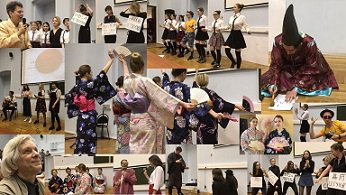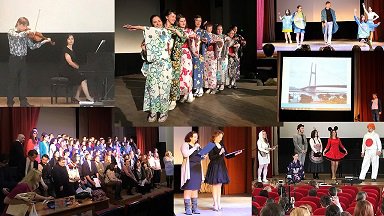The Multifaceted Nature of Learners, as Seen Through University and Events Outside the Classroom
Institute of Asian and African Countries, Moscow State University
MORIBAYASHI Ken
Generally, a lot of Japanese-language learning takes place in a limited space, such as a classroom, and so there is a tendency for mutual impressions to only be discernable through exchanges within the classroom. However, when it comes to events outside the classroom, we can see expressions that are different to the norm and parts of each other that we didn’t know about through operational activities, which can lead to discoveries and surprises in viewpoints and relationships that may tend to be static.
Furthermore, we once again realize the multifaceted nature of each learner and the diversity within the class, which leads to richer relationships and ways of running the classroom.
In this report, I will introduce the Japanese Cultural Festival and the closing ceremony, which offer such opportunities.
1.The Japanese Cultural Festival at Moscow State University
Firstly, a student’s day: most students seem to follow a pattern of spending their day in the University, from first period at 09:00 in the morning to the evening, returning home, tackling any homework after resting a little, and then going to bed at midnight or 1:00 am. The impression given is that they don’t participate in circles or club activities, or have part-time jobs; they also attend school on Saturdays, and matter-of-factly strive to study in the classroom too.
However, the Japanese cultural festival, held on a Friday night at the end of April, served as an opportunity to completely change this impression of these students. Scenes that I had never imagined from the normal appearance of the students in the classroom unfolded here.

The Japanese cultural festival at Moscow State University
In April 2018, the students put on a play about Hikaru Genji (a main character in the Tale of Genji, a classic work of Japanese literature) traveling through time to the present day and consequently regretting the way he lives his life; the story unfolded with the entanglements of characters such as a “monk,” “Moto Gaijin” (a former foreigner) and “Daikokuten” (god of wealth). The script was entirely Japanese, but the Russian was displayed so that students from other departments and teaching staff could understand it.
Scenes that I could never have imagined from the students’ normal behavior in the classroom unfolded, in the way the story developed, its presentation, songs, dances, costumes, and make-up, and amended my image of the students. After Hikaru Genji travelled in time, he was shown historical events from the Heian Period onwards in a comical, straightforward, well-paced manner, and when he was drawn into the political affairs of modern-day Japan, I could sense the ingenuity characteristic of the students of Moscow State University.
It was clear that considerable preparation was needed, but I was completely mystified as to when and how the students had secretly prepared while splitting the roles between the advanced and elementary level students in the Japanese Studies Department during days when they were pressed with homework after returning home; I was relieved that it seemed their days aren't over-full with study.
I look forward to seeing how the students will show me that they are freely bursting with ideas in the future.
2.The Closing Ceremony of the Japanese-Language Course in Moscow
The Japanese-language course in Moscow is offered twice a year, starting in the spring or the fall, and so a closing ceremony also takes place twice a year. Up to the 2017 spring semester closing ceremony in June last year, these closing ceremonies were held in the hall of the Library for Foreign Literature, but from the 2017 fall semester closing ceremony (in January 2018) onwards, they have taken place in the large hall of Moscow City University, which provides the classrooms for the Japanese-language course. The Japan Foundation has expanded its Japanese-language course to hubs all over the world, but it seems that some locations hold closing ceremonies like Moscow does, and some do not.
The participants consist of residents of Moscow who are interested in Japan and Japanese, and they have diverse backgrounds and ages; they might be university students, working adults, or people with non-Russian nationalities. This diversity is characteristic of a course aimed at the general public and is one of its charms—and we really sense it once again in the closing ceremony.

The closing ceremony of the Japanese-language course
The closing ceremony includes announcements of perfect attendance, the awarding of certificates, and participation reports on training in Japan; after this, volunteers from each class give a performance, and this is a key opportunity to catch a glimpse of the individuality and talents that we can’t guess at in regular classrooms.
When the time of the closing ceremony approaches, the participants confirm the date of the closing ceremony and start asking their contact person more and more questions about performances they hope to carry out.
If you’re wondering what kind of performances...
- Contemporary dance
- Classical violin or piano performances, etc.
- Theater
- Fashion shows
- Cosplay
- J-pop, songs, guitar performances
- Japanese dance
In addition, at the 2017 fall semester closing ceremony (in January 2018), the participant who was a professional master of ceremonies presided over the occasion, demonstrating professional ways of speaking and performance
The closing ceremony is attended by participants’ families and friends, and Japanese people they met during visitor sessions, making it useful for exchanges and building a network through Japanese-language learning.
- What We Do Top
- Arts and Cultural Exchange [Culture]
- Japanese-Language Education Overseas [Language]
- Japanese-Language Education Overseas [Language] Top
- Learn Japanese-language
- Teach Japanese-language
- Take Japanese-Language Test
- Know about Japanese-language education abroad
- The Japanese-Language Institute, Urawa
- The Japanese-Language Institute, Kansai
- Japanese-Language Programs for Foreign Specified Skilled Worker Candidates
- Japanese Language Education for Japanese Children Resident Overseas and for the Descendants of Migrants
- Archives
- Japanese Studies and Global Partnerships [Dialogue]
- JF digital collection
- Other Programs / Programs to Commemorate Exchange Year
- Awards and Prizes
- Publications
